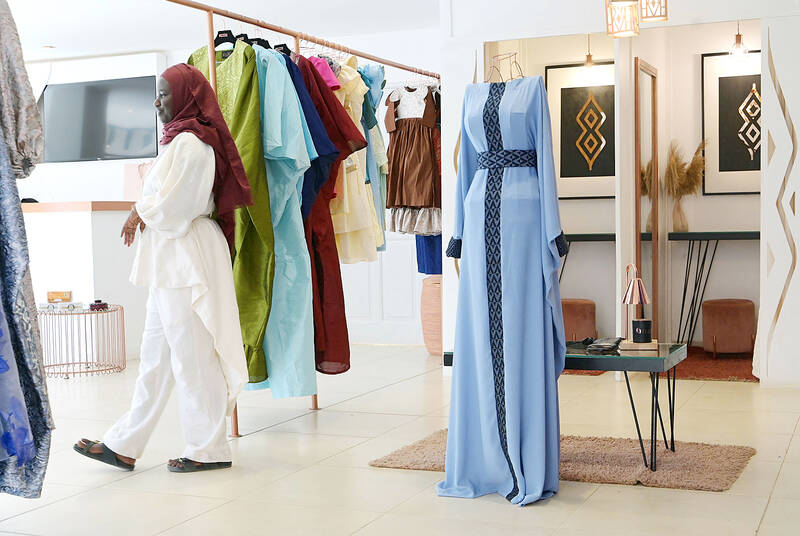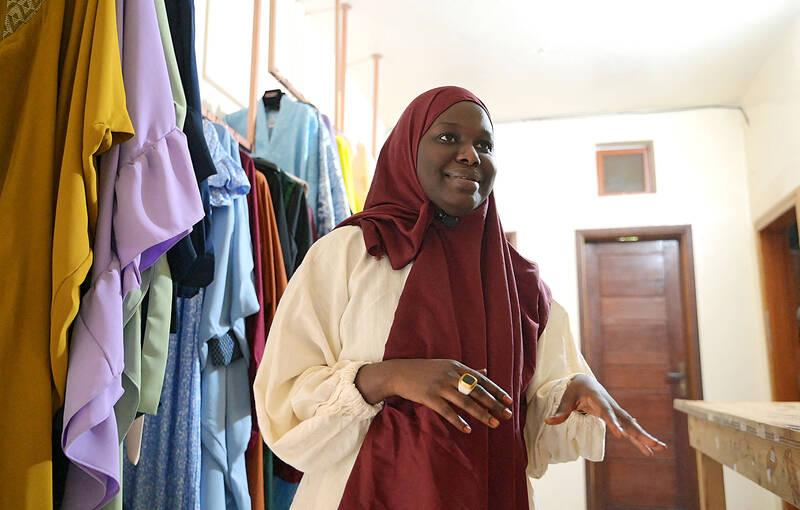Fatima Ba compliments a customer trying on one of her designs — a stylish silk dress in ocher with a gold motif made from start to finish in Senegal.
The founder of fashion label So Fatoo has made a name for herself in Senegal and beyond producing clothes that are locally made despite the country’s struggling textiles industry.
“Oh, it’s beautiful,” Ba enthused, as her customer emerged at the boutique in central Dakar wearing the V-necked creation with three-quarter length sleeves.

Photo: AFP
“Ten years ago, people didn’t wear so many locally made outfits,” she said.
Tailor Omar Niang, 51, who makes boubou robes fusing traditional styles and a modern twist, agreed that “Made in Senegal” clothing had become popular.
Locally produced clothes “are very trendy at the moment” and have helped drive his business significantly higher over the past few years, he said at a Dakar market.

Photo: AFP
Dresses, elegant traditional outfits for men, shirts, polo tops, sweaters — all are in vogue among a clientele generally from the upper middle class.
The popularity of locally produced wear has only grown since the arrival in power last year of Senegalese President Bassirou Diomaye Faye and Prime Minister Ousmane Sonko, fervent advocates of economic and cultural sovereignty.
In boubous made of west African embroidered bazin fabric, or custom-made with a round collar in a style known as an African suit, the two leaders never miss an opportunity to be seen publicly in locally made outfits.
Many Senegalese are following suit, opting to wear local labels at the office, when out and about or at official events.
However, producers face hurdles — taxes are high, and fabrics and clothes imported from abroad make for fierce competition.
Production costs in the west African country are high, while a lack of training hinders the industry and gaining access to finance is also difficult.
Just more than 11 percent of private companies are in the textile sector, which is the country’s second-biggest economic driver behind trade, according to the nation’s statistics from 2017.
However, the textiles industry also has the lowest economic performance, making just 1.2 percent of overall company turnover, a report by the National Statistics and Demography Agency showed.
The price of fabrics can be costly, and many people grumble that the quality is not up to scratch, prompting their preference for foreign products.
Prices at So Fatoo vary between 30,000 CFA francs (US$47) for a sweater and up to more than 300,000 CFA francs for a formal dress.
In a country where the average wage is US$85 a month, the clothes “are mostly aimed at a wealthy social class,” acknowledged Ba.
While it is easy to source fabrics for traditional outfits, the market is still in its infancy when it comes to manufacturing comfy wear such as jeans and T-shirts.
That is down to a lack of supply, but also weak technical ability among other things, Ba said.
Senegal is a cotton producer and was once known as an industrial hub for textiles, but the industry crumbled in the 1980s following the collapse of world cotton prices.
Aissa Dione a few years ago set up a machine-run production unit for fabrics, as well as a craft workshop.
However, on a recent visit, just two of the four machines, all old models, were fully operational, winding out lengths of fabric at the unit in a dusty outlying Dakar neighborhood, strewn with abandoned cars and rubbish.
About 30m of fabric are produced a day at the unit, but it is a drop in the ocean compared with what it could be turning out, said Dione, who has worked in textiles for 30 years.
“Senegal produces very good quality cotton, but is unable to transform its raw material. It’s paradoxical,” she said.
Industrialization is the “only solution for obtaining our sovereignty” in textiles, Dione said.
In a bid to breathe life into the sector, the new authorities relaunched in July last year an old textiles production factory in the central Kaolack region.
They also recently said they wanted in future to ban the import of second-hand clothes, a business which provides work for many Senegalese.
However, with thousands of tonnes of the much cheaper cast-offs coming into the country every year, the announcement has caused an uproar.

SEMICONDUCTORS: The German laser and plasma generator company will expand its local services as its specialized offerings support Taiwan’s semiconductor industries Trumpf SE + Co KG, a global leader in supplying laser technology and plasma generators used in chip production, is expanding its investments in Taiwan in an effort to deeply integrate into the global semiconductor supply chain in the pursuit of growth. The company, headquartered in Ditzingen, Germany, has invested significantly in a newly inaugurated regional technical center for plasma generators in Taoyuan, its latest expansion in Taiwan after being engaged in various industries for more than 25 years. The center, the first of its kind Trumpf built outside Germany, aims to serve customers from Taiwan, Japan, Southeast Asia and South Korea,

Nvidia Corp chief executive officer Jensen Huang (黃仁勳) on Monday introduced the company’s latest supercomputer platform, featuring six new chips made by Taiwan Semiconductor Manufacturing Co (TSMC, 台積電), saying that it is now “in full production.” “If Vera Rubin is going to be in time for this year, it must be in production by now, and so, today I can tell you that Vera Rubin is in full production,” Huang said during his keynote speech at CES in Las Vegas. The rollout of six concurrent chips for Vera Rubin — the company’s next-generation artificial intelligence (AI) computing platform — marks a strategic

Gasoline and diesel prices at domestic fuel stations are to fall NT$0.2 per liter this week, down for a second consecutive week, CPC Corp, Taiwan (台灣中油) and Formosa Petrochemical Corp (台塑石化) announced yesterday. Effective today, gasoline prices at CPC and Formosa stations are to drop to NT$26.4, NT$27.9 and NT$29.9 per liter for 92, 95 and 98-octane unleaded gasoline respectively, the companies said in separate statements. The price of premium diesel is to fall to NT$24.8 per liter at CPC stations and NT$24.6 at Formosa pumps, they said. The price adjustments came even as international crude oil prices rose last week, as traders

Taiwan Semiconductor Manufacturing Co (TSMC, 台積電), which supplies advanced chips to Nvidia Corp and Apple Inc, yesterday reported NT$1.046 trillion (US$33.1 billion) in revenue for last quarter, driven by constantly strong demand for artificial intelligence (AI) chips, falling in the upper end of its forecast. Based on TSMC’s financial guidance, revenue would expand about 22 percent sequentially to the range from US$32.2 billion to US$33.4 billion during the final quarter of 2024, it told investors in October last year. Last year in total, revenue jumped 31.61 percent to NT$3.81 trillion, compared with NT$2.89 trillion generated in the year before, according to